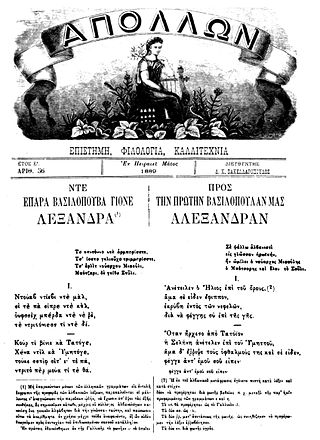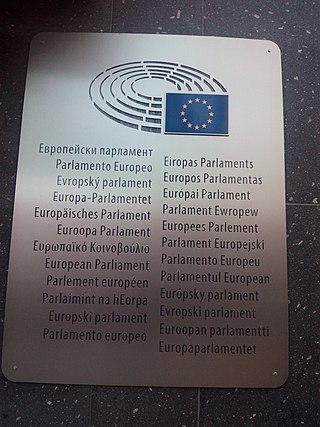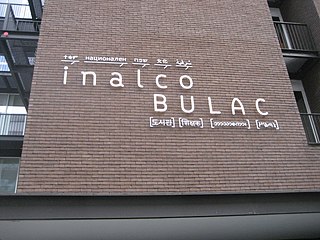Related Research Articles

Arvanitika, also known as Arvanitic, is the variety of Albanian traditionally spoken by the Arvanites, a population group in Greece. Arvanitika was brought to southern Greece during the late Middle Ages by Albanian settlers who moved south from their homeland in present-day Albania in several waves. The dialect preserves elements of medieval Albanian, while also being significantly influenced by the Greek language. Arvanitika is today endangered, as its speakers have been shifting to the use of Greek and most younger members of the community no longer speak it.
The Iberian Romance, Ibero-Romance or sometimes Iberian languages are a group of Romance languages that developed on the Iberian Peninsula, an area consisting primarily of Spain, Portugal, Gibraltar, Andorra and southern France. They are today more commonly separated into West Iberian and Occitano-Romance language groups.
Language policy is both an interdisciplinary academic field and implementation of ideas about language use. Some scholars such as Joshua Fishman and Ofelia García consider it as part of sociolinguistics. On the other hand, other scholars such as Bernard Spolsky, Robert B. Kaplan and Joseph Lo Bianco argue that language policy is a branch of applied linguistics.

The European Union (EU) has 24 official languages, of which three – English, French and German – have the status of "procedural" languages of the European Commission. The three procedural languages are those used in the day-to-day workings of the institutions of the EU.

The Flemish Region, usually simply referred to as Flanders, is one of the three regions of Belgium—alongside the Walloon Region and the Brussels-Capital Region. Covering the northern portion of the country, the Flemish Region is primarily Dutch-speaking. With an area of 13,522 km2 (5,221 sq mi), it accounts for only 45% of Belgium's territory, but 57% of its population. It is one of the most densely populated regions of Europe with around 490/km2 (1,300/sq mi).

France has one official language, the French language. The French government does not regulate the choice of language in publications by individuals, but the use of French is required by law in commercial and workplace communications. In addition to mandating the use of French in the territory of the Republic, the French government tries to promote French in the European Union and globally through institutions such as La Francophonie. The perceived threat from Anglicisation has prompted efforts to safeguard the position of the French language in France.

In linguistics, language death occurs when a language loses its last native speaker. By extension, language extinction is when the language is no longer known, including by second-language speakers, when it becomes known as an extinct language. A related term is linguicide, the death of a language from natural or political causes, and, rarely, glottophagy, the absorption or replacement of a minor language by a major language.

Institut national des langues et civilisations orientales, abbreviated as INALCO, is a French Grand Etablissement with a specializing in the teaching of languages and cultures from the world. Its coverage spans languages of Central Europe, Africa, Asia, America, and Oceania. With 104 languages taught as of 2024, this institution is currently the world's largest provider of language training courses.

LACITO is a multidisciplinary research organisation, principally devoted to the study of cultures and languages of oral tradition.
French Flemish is a West Flemish dialect spoken in the north of contemporary France.
The European Bureau for Lesser-Used Languages (EBLUL) was a non-governmental organisation that was set up to promote linguistic diversity and languages. It was founded in 1982 and discontinued in 2010. The organisation had close ties with both the European Parliament and the Council of Europe, and was funded by both the European Commission and local and regional governmental organisations.

The European Day of Languages is observed on 26 September, as proclaimed by the Council of Europe on 6 December 2001, at the end of the European Year of Languages (2001), which had been jointly organised by the Council of Europe and the European Union. Its aim is to encourage language learning across Europe.

Leonard Orban is a Romanian independent technocrat who served as the Commissioner for Multilingualism in the European Commission, the executive body of the European Union (EU). He was responsible for the EU language policy and was the first Romanian Commissioner and the first member of the Commission whose portfolio is exclusively multilingualism. His term of office began on 1 January 2007 and ended on 9 February 2010. With a background in engineering and economics, Orban has taken up various posts working for the accession of Romania to the European Union, most prominently as Deputy and later as Chief Negotiator for his country at the time of final negotiations with the European Union.
John Robert Edwards received a PhD from McGill University in 1974. After working as a Research Fellow at the Educational Research Centre in Dublin, he moved to Nova Scotia and joined the Psychology Department at St Francis Xavier University, where he is now Professor Emeritus and a Senior Research Professor. He is also an Adjunct Professor at Dalhousie University in Halifax. He has been a Visiting Lecturer at many universities, and a Visiting Professor in England, Ireland and China. He is an Honorary Professor at the Hong Kong Polytechnic University. Edwards is a fellow of the British Psychological Society, the Canadian Psychological Association, and the Royal Society of Canada (2000).
The British Association for Applied Linguistics (BAAL) is a learned society, based in the UK, which provides a forum for people interested in language and applied linguistics.
Linguistic ecology or language ecology is the study of how languages interact with each other and the places they are spoken in, and frequently argues for the preservation of endangered languages as an analogy of the preservation of biological species.

Lucija Čok is a Slovene linguist, senior researcher in the field of multilingualism and a professor of multilingualism and intercultural communication. Throughout her career, she has held several important positions, including that of the Minister of Education, Science and Sport (2000-2002) of the Government of the Republic of Slovenia. In her role as the Minister, she contributed to the establishment of higher education institutions in the Slovene region of Primorska and in 2003 she was elected as the first rector of the newly established university. She participated in European Commission high expert panels that have shaped linguistic policies and strategies of higher education and research. She has facilitated the preparation of the formal basis for Slovenia’s integration into the European Research Area. She was an expert of the Institutional evaluation program board and member of the Council of the Slovenian Quality Assurance Agency for Higher Education. Her research work and publications focus on the formation of models of bilingual education in areas of linguistic and cultural contact, sociolinguistic and didactics of intercultural communication. In 2013, the University of Primorska named her professor emeritus. The same year, she received a lifetime achievement award for her work in the field of Higher Education by the Ministry of Education, Science and Sport.
Ekkehard König is a German linguist and Professor Emeritus at the Free University of Berlin, specializing in linguistic typology, semantics, and the linguistics of English.

Tatiana Nikitina is a linguist conducting research into semantics, historical-comparative linguistics, formal syntax and linguistic typology. She has made a salient contribution to the study of reported speech. From an areal point of view, her work bears on Mande languages, Turkic languages, and some languages of Europe. Nikitina was awarded the CNRS bronze medal in 2017 for her groundbreaking work in general linguistics.

Maria Carme Junyent i Figueras, commonly known as Carme Junyent, was a Catalan linguist. Renowned in her work field, in particular for her defense of the Catalan language and studies on endangered languages, she was a professor of linguistics at the University of Barcelona. She specialized in African languages and sociolinguistics.
References
- 1 2 Gorter, Durk; Cenoz, Jasone (2012). "Regional minorities, education and language revitalization". In Martin-Jones, Marilyn; Blackledge, Adrian; Creese, Angela (eds.). The Routledge Handbook of Multilingualism. Routledge. p. 189. ISBN 9780415496476.
- 1 2 3 Siemund, Peter; Gogolin, Ingrid; Schulz, Monika Edith; Davydova, Julia (2013). "Multilingualism and Language Diversity in Urban Areas: An introduction". In Siemund, Peter; Gogolin, Ingrid; Schulz, Monika Edith; Davydova, Julia (eds.). Multilingualism and Language Diversity in Urban Areas: Acquisition, identities, space, education. John Benjamins Publishing. p. 2. ISBN 9789027272218.
- ↑ Leprètre 1994 , pp. 54–55.
- ↑ Leprètre 1994 , p. 58.
- ↑ Pejoska–Bouchereau, Frosa (2009). "L'abécédaire d'une langue interdite: Le macédonien". In Szende, Tamás (ed.). Politiques linguistiques, apprentissage des langues et francophonie en Europe centrale et orientale: les défis de la diversité. Éditions des archives contemporaines. p. 28. ISBN 9782813000033.
- 1 2 Shuibhne 2002 , p. 272.
- 1 2 Leprètre 1994 , p. 54.
- ↑ Leprètre 1994 , pp. 54, 56.
- ↑ Leprètre, Marc (1994). "El projecte Euromosaic: un estudi sobre les llengües minoritàries" [The Euromosaic project: A study on minority languages]. Llengua i Ús. Revista Tècnica de Política Lingüística (in Catalan). 1: 54–57.
- ↑ Shuibhne, Niamh Nic (2002). EC Law and Minority Language Policy: Culture, Citizenship and Fundamental Rights. Kluwer Law International. pp. 272, 274. ISBN 9789004478718.
- ↑ O'Reilly 2016 , p. 9.
- 1 2 O'Reilly 2016 , p. 10.
- ↑ O'Reilly 2016 , pp. 10–11.
- ↑ O'Reilly, Camille C. (2016). "Introduction: Minority Languages, Ethnicity and the State in the European Union". In O'Reilly, Camille C. (ed.). Language, Ethnicity and the State, Volume 1: Minority Languages In The European Union. Palgrave. p. 11. ISBN 9780230504639.